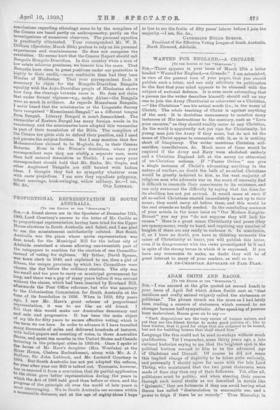• PROPORTIONAL REPRESENTATION IN SOUTH AUSTRALIA. pro THIL EDITOR Of
TI U "SPECTATOX."1 SIa,—A friend shows me in the Spectator of December 12th, 1908, Lord Courtney's answer to the letter of Mr. Carlile as to proportional representation having been tried for the Upper Rouse elections in South Australia and failed, and I am glad to see the misstatement satisfaotorily refuted. But South Australia was the place where quota representation was first tried, for the Municipal Bill for the infant city of Adelaide contained a clause allowing one-twentieth part of the ratepayers to combine for the election of one Councillor instead of voting for eighteen. My father, David Spence, Was town clerk in 1840, and explained to me, then a girl of fifteen, the unique provision by which two Councillors were chosen the day before the ordinary election. The city was too small and too poor to carry on municipal government for leag, and there was a gap of many years before it was revived Without the clause, which had been inserted by Rowland Hill, afterwards the Post Office reformer, but who was secretary to the Colonisation Commission for South Australia at the time of its foundation in 1836. When in 1859, fifty years ego, I saw Mr. Hare's great scheme of proportional representation, it was to me like an old friend. I felt that this would make our Australian democracy real and safe and progressive. It has been the main object ef My life for fifty years to secure effective voting, which is the term we use here. In order to advance it I have travelled laanY thousands of miles and delivered hundreds of lectures, With ballot-papers and counting of votes, in three Australian !States, and spent ten months in the United States and Canada lecturing in the principal cities in 1893-94. Once I spoke at tile house of Mr. Hare's daughter (Mrs. Westlake) at the .Itiver House, Chelsea Embankment, along with Mr. A. J. Balfour, Sir John Lubbock, and Mr. Leonard Courtney in 1894. But South Australia has not yet adopted the reform, filer Year after year our Bill is talked out. Tasmania, however, 113 Te•enaeted it from a conviction that its partial application to the cities gave better representation during the years in which the Act of 1896 held good than before or since, and the Pl'egrese of the principle all over the world of late years is Ineet encouraging. We in South Australia see success within a measurable distance, and at the age of eightpthree I hope to live to see the fruits of fifty years' labour before I join the majority.—I am, Sir, &c., '
CATHERINE HELEN SPENCE,
President of the Effective Voting League of South Australia. North Norwood, Adelaide.






































 Previous page
Previous page